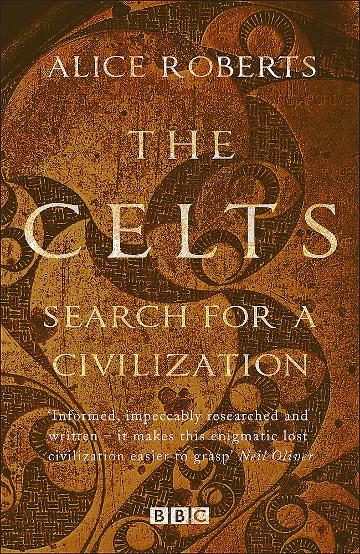Alice Roberts
The Celts
The Celts
Couldn't load pickup availability
Lindsay's Review
The Celts as a people have long been overlooked by readers interested in ancient civilisations. Most people presume to know the Celts from the few published works, researched mainly during the European nationalistic fervour of the twentieth century. Past studies usually focus on individual archaeological sites, or randomised artefacts and elements of Celtic society. Alice Roberts’ book, The Celts, follows her (and Neil Oliver’s) travels around greater Europe from Scotland to Turkey, as she tries to understand how recent archaeological discoveries and new evaluations of contemporary historical accounts can bring forth from the shadows a stitched-together portrait of the real Celts. The book focuses on the important and oft overlooked fundamental questions: “Who were the Celts?”, and “How did they consider themselves?”.
After careful analysis, the complexity of the indigenous Celtic civilisation shows a world culturally connected through shared beliefs and forms, prone to localised idiosyncrasies, yet forming a societal and language bond that created a loosely formed political confederacy from Britain to Asia Minor. Much in the same way that the kingdoms of Archaic Greece can be called a civilisation. The Celts are seen to be the missing piece of the Iron Age puzzle in which trade, war and quest for glory was a shared ethos between the Persian, Greek and Roman empires. The Celts held their quarter of the world with the same gusto of intrigues, greed, internal quarrelling and mutual respects as the other Mediterranean-world civilisations.
Understanding that most of our images of Celts comes from Roman propagandistic writing, which sought to claim glory for victory over the barbarians, allows space for a more nuanced vision of the Celtic tribes. A more sophisticated version of Celtic life is also available because of recent archaeological finds. Hueneburg citadel with mud walls and towers, the Galatian ability to merge with Greek life, and the strongly decentralised nature of the Druidic-led culture are just some of the fascinating aspects revealed through Roberts’ portrayal of the people who left few, but telling, archaeological remains. The Celts I knew before I entered their realm are a shadow of the Celts I emerged with at the end of the journey. This book is an important read for anyone who loves the Iron Age period, and Classicists too, as it is time for us to re-consider who the Celts were. Only then can we really find their legacy in modern Western culture.
Publisher's Review
Alice Roberts goes in search of the Celts and their treasures in a narrative history to accompanying a new BBC series.
We know a lot about the Roman Empire. The Romans left monuments to their glories and written histories charting the exploits of their heroes. But there was another ancient people in Europe - feared warriors with chariots, iron swords, exquisite jewellery, swirling tattoos and strange rituals and beliefs. For hundreds of years Europe was theirs, not Rome's. They were our ancestors, and yet the scale of their achievements has largely been forgotten. They were the Celts.
Unlike the Romans they did not write their history, so the stories of many heroic Celtic men and women have been lost. And yet we can discover their deeds. . . you just have to know where to look.
From Denmark to Italy; Portugal to Turkey Alice Roberts takes us on a journey across Europe, revealing the remarkable story of the Celts: their real origins, how they lived and thrived, and their enduring modern legacy.
Using ground-breaking linguistic research, in addition to the latest archaeology and genetics, Alice Roberts will explore how this remarkable and advanced culture grew from the fringes of the continent and humiliated the might of Rome.
The Celts accompanies a substantial BBC series presented by Alice Roberts and Neil Oliver, and showing in October 2015.
Share


